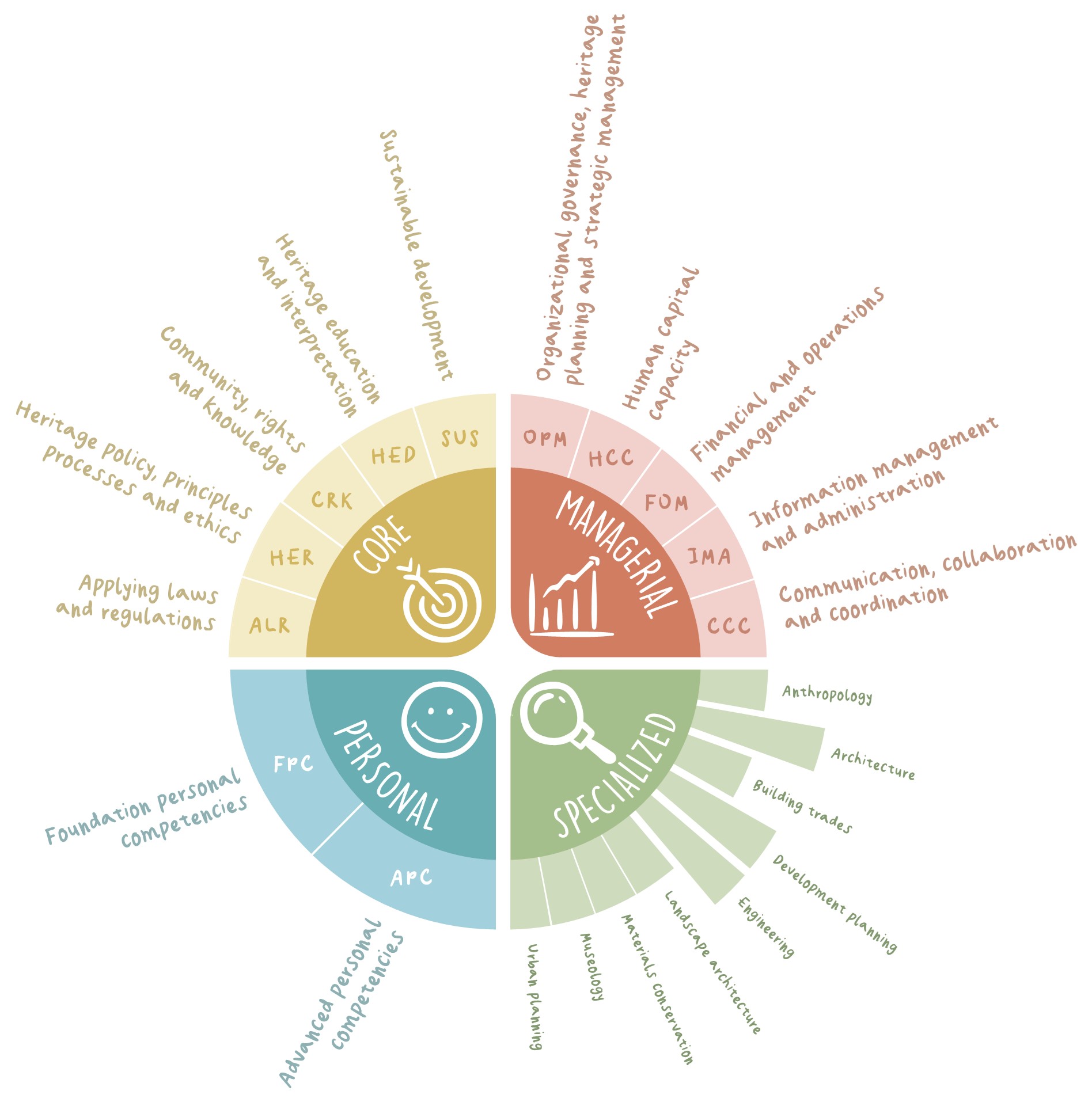Competence Framework for Cultural Heritage Management
As the scope of cultural heritage has expanded over the years, with the addition of cultural landscapes and other typologies, the types of challenges encountered by heritage practitioners have become more multi-dimensional and complex. Beyond technical conservation issues, such as addressing biological or structural decay, which were the earliest concerns of the heritage profession, successfully conserving a site today also requires taking into account various economic, social and environmental dimensions. Furthermore, it involves a wider range of stakeholders, organizations and actors, beyond those in the heritage sector.
Reflecting the evolving situation in heritage contexts and the competence-based approach, and with a view to professionalizing heritage occupations, in 2018 UNESCO, in consultation with several partners, initiated the development of the Competence Framework for Cultural Heritage Management.
The Framework was developed with invaluable inputs from the following organizations: the ASEAN Secretariat, the International Centre for the Study of the Preservation and Restoration of Cultural Property (ICCROM), the International Council on Monuments and Sites (ICOMOS), the International Labour Organization (ILO), the International Union for Conservation of Nature (IUCN), the Organization of World Heritage Cities (OWHC), the SEAMEO Southeast Asian Regional Centre for Archaeology and Fine Arts (SPAFA), the SEAMEO Regional Centre for Vocational Education and Training (VOCTECH) and the World Heritage Institute of Training and Research for the Asia and the Pacific Region (WHITRAP).
The Competence Framework has three main purposes:
- To identify the various competences, notably skills and knowledge, that are necessary for cultural heritage work to be carried out effectively and sustainably. In this regard, it can be seen as a menu of options for heritage practitioners to select from, depending on their needs and the context of their heritage site and organizations.
- To facilitate the design of appropriate education and training for cultural heritage professionals.
- To enable professional qualifications systems to be established, and to eventually enable professional certification and licensing systems to be introduced.
While the Framework focuses on World Heritage sites in the Asia-Pacific region, particularly in South-East Asia, it is applicable more broadly.
What is the Competence Framework?
The Competence Framework identifies areas of competence (i.e. skills and knowledge) for various practitioners, in both institutional and individual contexts, involved in managing cultural heritage, including government staff, professionals and local stewards. The Framework covers four levels of personnel: (1) skilled workers, (2) middle managers / technical specialists, (3) senior managers and (4) executives. In this way, it spans all types of personnel, from vocational workers to decision-makers, involved in the various aspects of managing cultural heritage.
The Framework defines four groups of competences, and each group has multiple categories:
The Framework presents the wide range of skills and knowledge that individuals and organizations involved in cultural heritage management should have. Possession of the Core, Managerial and Personal Competences will ensure that heritage practitioners are in a position to fulfil their functions effectively and comprehensively. The Specialized Technical Competences describe the additional skills and knowledge specific to heritage work needed on top of the regular education and training currently available to many professions. For example, these would be the skills required to transform a mainstream architect into a competent conservation architect. Depending on the size and set-up of their home organization, a practitioner may have responsibilities that require Specialized Technical Competences across multiple professional disciplines.
Who can benefit from the Framework?
The Competence Framework is a useful tool for:
- Heritage management organizations
- Individual heritage management staff, heritage professionals and local stewards
- Educational and training institutions
The Competence Framework presents a different approach compared to other capacity building initiatives in the cultural heritage sector by adapting a tool that has proven successful in the field of natural heritage management and other occupations. It provides guidance for site managers, heritage organizations and other practitioners to assess their skills and to identify gaps that need to be filled in order to improve their performance. It can also be applied by individuals, including students, professionals and decision-makers. Furthermore, it is a useful reference for professionals and workers who are not directly in the heritage sector but who may be involved in developing or implementing heritage policies, programmes and projects, such as municipal staff in cities with heritage assets. The Framework provides a common benchmark against which to assess institutional capacity. It is also a useful tool for harmonizing educational and training programmes in a more output-oriented manner.
|
Competence-based Academic Learning Outcomes for Postgraduate Education in Cultural Heritage Management While most professionals in the Asia-Pacific region acquire much of their skill and knowledge in the heritage field through work-based learning and personal experience, an increasing number of professionals in the region are gaining skills and knowledge from education programmes in cultural heritage management, which are becoming more numerous and accessible. Based on the Core Competences and Managerial Competences in the Competence Framework, UNESCO developed a set of Academic Learning Outcomes for Postgraduate Education in Cultural Heritage Management. The Learning Outcomes are designed to help higher education institutions in this field to better prepare their graduates and ensure that the graduates’ skills, knowledge and attitudes meet industry needs and expectations, thus enhancing graduates’ career prospects and performance, as well as contributing to improving the management of cultural heritage. |
Next steps
Below are upcoming activities (2020-2021) to facilitate widespread dissemination and adoption of the Competence Framework.
- Competence Framework e-publication with detailed explanation on the Competences and guidance to applying the Framework
- Sustainable Heritage Management Foundation Course
- Competence Framework website with a self-assessment function for individuals
- Implementation of the Framework at pilot World Heritage Sites in South-East Asia
- Translation of the Framework into various languages
Updates on above items will be shared via UNESCO website and social media accounts.










